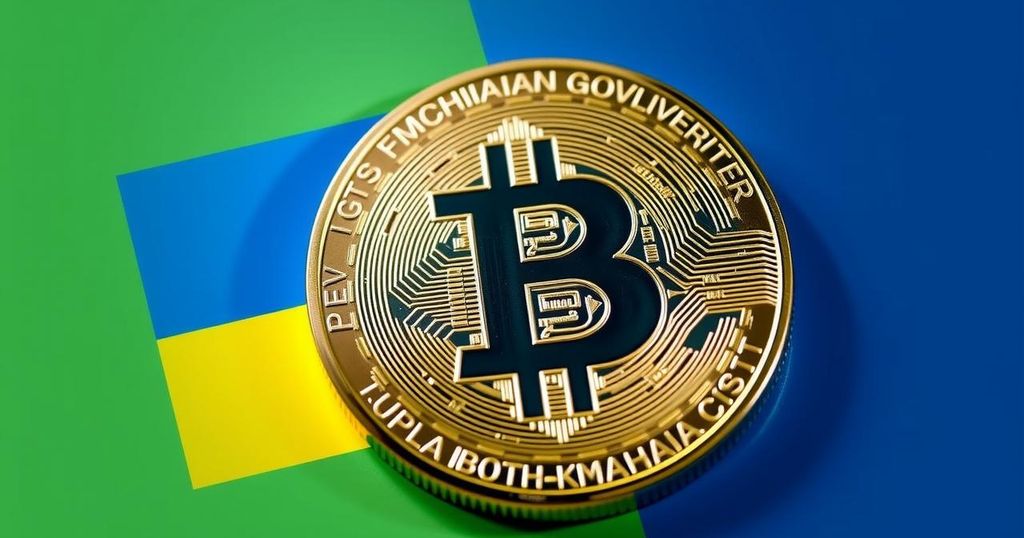Ukraine Harnesses Cryptocurrency to Fundraise Amid Ongoing Conflict
Ukraine’s government has raised $63.8 million through crypto donations since the invasion began. With over 120,000 contributions, notable donations include $5.8 million from Polkadot’s founder and a CryptoPunk NFT worth $200,000. Despite the success, the rise of scams targeting those wishing to support Ukraine highlights the need for vigilance in this new fundraising landscape.
In the midst of a maelstrom of conflict, the Ukrainian government has turned to the digital realm for support, seeing its coffers swell with an astonishing $63.8 million in cryptocurrency donations since the onset of the Russian invasion. This remarkable surge of funding has been bolstered by over 120,000 individual contributions, notably including a generous $5.8 million gift from Gavin Wood, the founder of Polkadot, and a conceptual CryptoPunk NFT valued at over $200,000. The overwhelming majority of these contributions have come from crypto enthusiasts embracing Bitcoin, Ethereum, and various stablecoins, thrusting digital currency into a vital role in this humanitarian crisis.
The call for aid echoed across social media platforms on February 26th when the official channels of the Ukrainian government appealed directly to the global community for crypto donations. Their cries were met with an avalanche of kindness, accumulating $54.4 million predominantly through Bitcoin and Ethereum transactions. Among the most noteworthy contributions was a stunning $1.86 million donation, tracing its roots back to the sale of NFTs crafted by Julian Assange and digital artist Pak, highlighting the dynamic avenues through which support is being channelled.
Additionally, another significant player, the NGO Come Back Alive, supports military efforts and has also received millions in crypto. Despite a recent suspension of their Patreon due to policies regarding military support, the NGO showcases the resilience and adaptability necessary in these tumultuous times. Additionally, creative fundraising initiatives have emerged, such as UkraineDAO, which raised an impressive $6.5 million through an NFT auction of the Ukrainian flag, illustrating how digital assets can transcend borders and traditional fundraising methodologies.
However, within this landscape of generosity lurks danger, as opportunistic scammers attempt to exploit the emotional landscape created by the war. Multiple fraudulent fundraising scams have been identified by the monitoring firm Elliptic, targeting those eager to assist. This underlines the duality of the digital age, where the potential for goodwill intertwines with the shadow of deception, making vigilance paramount in securing charitable intentions.
As modern warfare increasingly entwines with technology, Ukraine’s response to the Russian invasion reflects this new reality. The country has harnessed the power of cryptocurrency, thus sidestepping conventional fundraising channels. This shift represents not just a trend, but a necessity, as traditional financial institutions may falter under the pressures of conflict. The speed and borderless nature of cryptocurrency allow for immediate support, enabling nations and NGOs to respond robustly to crises. Furthermore, crowdfunding via digital assets presents a new paradigm, showing the intersection of technology and humanitarian efforts in an age marked by rapid digital evolution. The Ukrainian government’s strategic shift to crypto fundraising highlights a growing awareness of digital currencies’ potential and risks. This approach empowers individuals globally to contribute directly, fostering a sense of unity amid adversity. Through social media and blockchain technology, an unprecedented wave of assistance can transcend geographical limits, standing testament to the resilience of the human spirit.
In conclusion, the Ukrainian government’s pivot to cryptocurrency during the ongoing crisis has become a beacon of hope, illuminating the power of digital currency in humanitarian efforts. With an influx of millions in donations and innovative fundraising through NFTs, the world has rallied in an unprecedented way. However, the shadow of deceit reminds us to tread carefully through this uncharted territory. This duality underscores the importance of safeguarding humanitarian intentions amidst the rapidly evolving digital landscape.
Original Source: www.elliptic.co




Post Comment